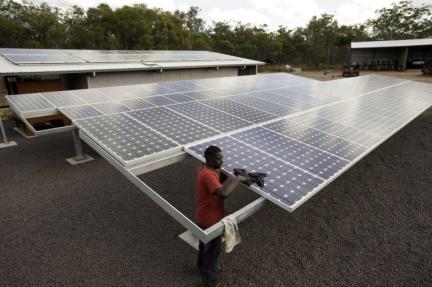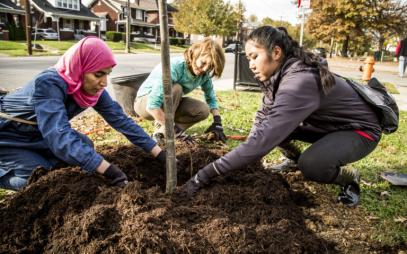Would you rather be covered in fur or scales? Would you rather save babies or trees?
This kind of stark dilemma can be an entertaining conversation starter at a party, but it should not be the entry point we use to frame conversations about changing the world.
 As the global community strives to achieve the Sustainable Development Goals, many seem stuck on this kind of entry point. This year’s UN General Assembly schedule—with separate high-level meetings to discuss health versus climate change—is set up to implicitly ask: “Would you rather provide universal health care for all, or stop climate change?”
As the global community strives to achieve the Sustainable Development Goals, many seem stuck on this kind of entry point. This year’s UN General Assembly schedule—with separate high-level meetings to discuss health versus climate change—is set up to implicitly ask: “Would you rather provide universal health care for all, or stop climate change?”
Many of us have thought—and been taught—that we must choose. But over and over, the world shows us that this setup is a red herring—or worse, a deadly false choice for people and all life on the planet.
Driving Bigger Change Faster
In fall 2019, we released a report that asks people to think, act, and fund differently to solve the major challenges facing people and the planet.
Bigger Change Faster: Integrated Development, Health, and Environment Actions for a Sustainable Future is co-authored by the United Nations Development Programme and the Bridge Collaborative—a partnership led by The Nature Conservancy, PATH, the International Food Policy Research Institute, and Duke University.
In the report, we agreed on a set of three global challenges for sustainable development where one thing is crystal clear—we will fail unless we act together and break out of our silos. These challenges cut across global development, human health, and the environment, and they won’t be solved by any one of these communities alone.
While many have noted some version of these challenges before, we emphasize the specific sectoral elements that need to hang together for the challenge to truly be solved. Ignoring these connections is likely to advance one group’s interests at the expense of progress for others. We also emphasize the importance of equity, recognizing that poorer countries, and the poor and marginalized in all countries, are far more vulnerable to climate, health, economic, and other shocks.
For example, the first challenge area addresses the need to accelerate a low-carbon, clean air, and environmentally friendly energy future for all. We often hear about an energy transformation to stabilize the climate and stop one of the biggest health risks of our time—air pollution. But investments in renewables are favoring wealthier populations, and failing to emphasize equitable access to clean, modern energy for all. And this challenge holds a paradox: expanding renewables is necessary, but renewable infrastructure can have major environmental impacts. Solar has a large land footprint, and hydropower is already a leading threat to rivers.
 The other two integrated challenges included in the report are to transform the global food system for better health and sustainability, and to improve sanitation and wastewater treatment to maximize benefits for people and nature.
The other two integrated challenges included in the report are to transform the global food system for better health and sustainability, and to improve sanitation and wastewater treatment to maximize benefits for people and nature.
To make headway on these challenges, the report presents nine actions that are ready now for greater effort and investment. For example, we advocate for greater involvement of health sector decision-makers and stakeholders when designing energy policies and building or retrofitting energy services. Doing so will help maximize outcomes for energy, health, and climate, and make sure improved health conditions are available for those currently most harmed by unclean energy sources.
Sparking Action
We aimed for the report to be a focusing point to help each of us take a few steps away from our usual more siloed entry points and meet in the productive middle ground: a place where powerful change can happen now.
Solving these challenges is like making a cake—and each community holds different, necessary ingredients. Any one sector will not make the cake by stirring its own ingredients harder, or reminding everyone how bad the cake will be without their ingredients. We must act together.
To help drive the change we sought, we held a call for proposals through the Bridge Spark Fund. Through this Fund, we supported solutions that help solve the Bigger Change Faster challenges. We hope that this contribution to driving integrated solutions will be dwarfed by major funders bringing similar programs online, shifting today’s heavily siloed funding universe to better match the reality of the integrated challenges we face.
Funders are critical in driving the change we seek, but they are not the only ones who can act now. The next time you design a class, choose a vacation destination, buy food, award a grant, call a ministry meeting, make a supply chain or investment decision, train a professional, give a talk, organize a protest, vote, or talk to your friends or family, resist the urge to choose between people and the planet.
Choose both.
Author:
Heather Tallis, Ph.D.
Secretariat Chair, Bridge Collaborative
Global Managing Director and Lead Scientist for Strategy Innovation, The Nature Conservancy
Image credits: Ted Wood/TNC (upper), Devan King/TNC (lower)

